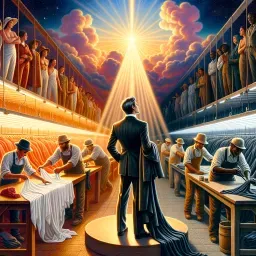A public office is a public trust

0
0
0
0
- Meaning
- **Analysis of the Meaning:** The phrase "A public office is a public trust" means that individuals who hold public office have a duty to act in the best interests of the public rather than for personal gain. It emphasizes accountability, transparency, and the ethical handling of public resources and responsibilities. Essentially, it declares that those in power must serve the public good, reflecting a principle of servant leadership and stewardship.
- Allegory
- **Explanation of the Image Elements:** The public official represents individuals in positions of authority and their role as servants to the people. The podium elevates the official, illustrating the importance and visibility of their role. The transparent, glowing book symbolizes the transparency and purity of intentions required in public service. Symbols of justice (scales) and integrity (open hands) highlight core values essential for maintaining public trust. The tools like books or medical supplies emphasize the services provided to the community. The expressions of hope and faith in the crowd signify the trust placed by the public in their leaders. The ideal cityscape in the background evokes the notion of a thriving, just society flourishing under ethical governance.
- Applicability
- **Applicability:** In personal life, this phrase can be applied to any leadership or stewardship role, whether it's in a community organization, business setting, or family. It teaches the importance of responsibility, integrity, and selflessness in positions of authority. For public officials, it serves as a reminder to prioritize public service over personal ambition or gain.
- Impact
- **Impact:** The phrase has had a significant impact on American political culture and legal systems. It has been invoked in numerous ethical codes, legal standards, and political speeches to emphasize the importance of fiduciary responsibilities in public office. This phrase has inspired reforms in public administration and governance aimed at combating corruption and ensuring that public servants act in the best interests of the people.
- Historical Context
- Historically, the phrase gained prominence in the United States during the Progressive Era, which spanned from the 1890s to the 1920s. This period was marked by numerous reforms aimed at reducing corruption and increasing transparency in government. Public figures like Grover Cleveland and Theodore Roosevelt frequently invoked the notion that holding office is a public trust to advocate for ethical reforms and accountability.
- Criticisms
- **Criticisms and Controversies:** Critics argue that the interpretation of "public trust" can be overly idealistic and challenging to enforce practically. Some contend that political realities often lead to conflicts of interest and that the phrase can sometimes be used more as a rhetorical device than a guide for actual practice. There are also situations where conflicting interests make it difficult to define what serving the public good truly entails.
- Variations
- Interpretations of this phrase can vary across cultures. In many Western nations, it emphasizes democracy and accountability, whereas in other cultures, the interpretation might stress communal welfare or the paternalistic care of a leader for their people. Variations might also emphasize different aspects of trust, such as transparency or responsibility.
-

I pity the man who wants a coat so cheap that the man or woman who produces the cloth will starve in the process.
-

I may be president of the United States, but my private life is nobody's damn business.
-

Speak softly and carry a big stick; you will go far.
-

He serves his party best who serves the country best.
-

Yesterday is not ours to recover, but tomorrow is ours to win or lose.
-

A pound of pluck is worth a ton of luck.
-

Politics, when I am in it, it makes me sick.
-

What is right and what is practicable are two different things.
No Comments